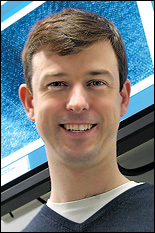Cumings Discusses Crane Collapses Online
Department of Materials Science and Engineering Assistant Professor John Cumings was online with Washington Post staff writer David Brown on June 16 to discuss Brown's story about the recent tower crane collapses in New York City and Miami, Fla. The chat session, titled "Physics of a Crane Collapse," was a follow-up to a story published the same day, for which Cumings was also consulted.
Brown's story and discussion focused on whether tower cranes—huge, modular pieces of equipment capable of building high-rise buildings in crowded city spaces—were inherently unsafe or prone to structural failure. Cumings was one of several professors in his story who discussed the physics and materials science behind the design, operation and construction of the cranes.
Tower cranes have good safety records overall. The engineering behind them, such as how they balance, how much they can safely lift, and how they are affected by forces created by wind or swinging loads, is well established. However, they are also subject to environmental stresses leading to metal fatigue and failure, and to human error. Corrosion and repair sites provide opportunities for metal to bend or break, while improperly trained inspectors and operators can miss danger signs or cause accidents. The expense of renting a tower crane and hiring an experienced operator coupled with a recent construction boom may also play a role in whether or not the equipment can be used safely.
"[The] design of cranes relatively straightforward," Cumings wrote in the online chat. "However, I can imagine that on a job site there might be a tendency to[ward] pushing the limit, even a little bit, in order to move a job along faster. No level of mathematics ahead of time can solve this problem down the road."
Read a transcript of the online chat session.
Read Brown's related story: "Tower Cranes: Efficient, Versatile—but How Safe?"
Visit the Washington Post's Science home page
June 16, 2008 Prev Next |


